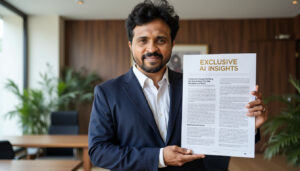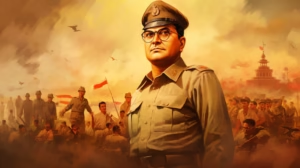It was 10 am on a Monday morning. Instead of being in the weekly meeting at the office, Somashekar or Som (as he preferred to be called) was sitting in a waiting hall. He had a round token numbered 29 in his hand while the big display board in front of him was flashing number nine. Tokens were a bit strange as it was not a hospital nor a bank but an ashram. Twenty more to go before his turn sounded really bad. In India, no one is a stranger to waiting, but a tough overnight journey to this remote location and a drained cell phone had made it more painful than it should have been.

Thirty minutes of forced solitude is what Som could manage. He turned around out of boredom to find some inspiration to avoid falling asleep, but there was nothing in sight. There were around thirty plus people, mostly old aunties and uncles and some foreign hippies in between. Moments later his eyes falls on a beautiful young lady sitting opposite to him. She was so beautiful that Som could not take his eyes off her. At one point she looks back directly at him, and all he could muster is an awkward smile. But, to his surprise, she returns the favour and turns back to her mobile. ‘Was this my lucky day?’ he wondered.
A rush of testosterone instructs him to change his seats, but an equally strong thought interjects moments later asking him to stop being stupid. It reminds him of countless failed attempts at trying to secure a date and also about the importance of why he is here today instead of attending the Monday morning meeting. All these infighting in his brain makes him take the 2nd exit out to the adjacent garden.
‘Bloody Hell! this is not a garden; this is a Mini forest’ he thought.
Roughly after an hour, Som returns into the room just in time to see his number on the big screen. He follows straight through the 3rd door as everyone else before him. After walking through several doors, he finally makes it to the bright room with glass walls and sits on one of the two orange chairs in front of Guruji’s podium. He waits patiently for the Guruji to finish his meditation and open his eyes. As he waits looking at the Guruji in flesh and blood, he remembers the first time he saw Guruji’s video and excitement rise again.
“How can I help you? What made you come here?” asks a smiling Guruji.
“I am 32 years old; I have a good job which pays me well. It was my dream job when I started nine years ago, but I am not happy with what I am doing now. I am so unhappy that I feel I have a phobia for Monday mornings. Sure, I know that a lot of us crib about work but I find my problem to be severe. This is the 3rd straight Monday that I am bunking work.”
“I don’t think I can continue like this. Changing jobs will not help as I feel I am not cut out for a 9-5 job. The answer is to find my passion. I realised this many years ago, and since then my search has been relentless. There is nothing that I haven’t tried – books, courses, seminars, retreats and countless hours of online videos. You name it, I have tried it, but at the end of the day, I haven’t found the bloody thing.”
Som continues after a big sigh. Even thinking about the effort he has put seems to make him tired.
“Even after trying so many things for so many years, I have not come close to finding my passion. When all hopes were all but lost, I saw your video helping a young chap solve his emotional problems. It was fascinating and was blown away by what you did. So I have come here to you with a lot of hope. Could you help me to find my passion?”
Guruji smiles and closes his eyes. Moments later, he speaks.
“Som, you feel desperate. I can feel the earnestness in you. So is it fair to say that you can do anything to get your passion?”
Som was surprised and was taken aback by the nature of the question, but his answer was instantaneous.
“Yes, Of course, Guruji. No second thoughts.”
Guruji heads out through the back door and returns with a small pot.
“Som, take this sapling. Please take good care of it. Nurture it every day like a mom would care for her child. Come back after a year, and I will tell you what your passion is. I know it is a long wait, but I guarantee you that it will be worth it. Would that be OK?”
Som’s immediate feeling is of disappointment. He came all the way in search of an answer but what he got was more actions instead – a years’ worth at that. But, his attention is drawn on to the word ‘guarantee’ and he became positive again. He nods and takes up the sapling and the challenge. He pondered a little more on his way back, and the conclusion was obvious.
“At least I have something to do rather than the same old ‘positive thinking’ or ‘keep looking’ mantra that everybody throws at him.”
****************************************************************************
A year and a bit pass in no time, and Som finds himself in front of Guruji again. This time two people are smiling in the room instead of one.
“So tell me, do you want to know what’s your passion is?” asks Guruji.
“No Guruji, I think I now know my passion. Thanks a million!”
The collective smiles in the room increase as Som continues.
“I took your task seriously, and it did the trick. I started off by finding a small place, a short drive away from home as the place for the sapling. I visited it every day and made sure that it had the right amount of water and nutrition. In three months it had grown into a big plant.”
“All of this got me thinking. I was visiting this place every day and hence why not go for more? So, I requested the owner to use the small block of land around the first plant and planted thirty more saplings of same kind. The additional cost was nominal as I borrowed water from neighbor’s well and got the nutrient-rich compost from a nearby farm, both for free. In six months, all of them grew into small little trees. I felt like I was the proud mother of 30 odd teenagers.”
As Guruji chuckles Som takes a sip of water and continues.
“An owner of a neighbouring land saw my ‘project’ and offered to lend his half an acre for free to plant anything of my choice. I was excited but was not sure what to do with such a huge place. A few days later, I got the idea. I was always fascinated by thick vegetation on discovery and NatGeo channels and hence decided to create what I called ‘urban forests.’ Most of my friends and family lauded this as an awesomely creative project. I thought I was the first to think of this, but a google search burst my happy bubble. I was disappointed to see so many who have created urban forests before me. All my life I have never been first at anything and how can this case be any different?”
“It just took thirty minutes to turn my sadness of not being the first to joy because I found so much information on how to get started. Within the next two months, my mini forest project was up and running. I had many challenges along the way, but I was motivated to get this through. I had never taken up such an amazing project before you see. So, in the next four to five months the forest grew into dense vegetation with all kind of plants, trees, and herbs, the kind I have only seen on TV. This attracted a different type of insects and birds and enriched the mini forest even more.”
“When you do something useful and interesting, the world will surely recognise that. So as this forest was unique in my locality, people got to know it in different ways, and they started visit to see, appreciate and also to get some advice. I did not recognise that what started with a sapling was resulting in my passion. It was only yesterday when this hit me when a reporter asked me the source of my passion for trees. That made me recollect how it all started and I immediately got a taxi and came here to see you”.
“So, Guruji, Thanks to you, I am right now working as a part-time urban forest consultant. I have contributed to the inception of 30 forests directly or indirectly, and I feel very proud of it. I cannot thank you enough for what you did a year ago. I now know that this is my passion and I can see myself starting this full time within the next year.”
Guruji smiled, looked up, closed his eyes for a moment, but Som was not done.
“Guruji, I have a question for you. Did you know that growing plants was my passion? Did you have an insight that I will get here on my journey? If you did then why you did not tell me this last year itself? Maybe… just maybe, I would have become the reason behind say a hundred forests instead of thirty. Is it not?”
Guruji’s smile turned into a grin and was followed by a small chuckle.
“Som, what is a passion? Let us understand the word first. Passion is that activity which we love to engage in. We love it so much that we would not care much about anything else when we are engaged in it. We would love to do it regardless of time or the day it is. We want to engage in our passionate activity as long as we can. But the problem is that we all have twenty-four hours in a day. So for us to be able to spend more on our passion beyond a point, we will have to find a way to replace our work with passion. Why? Because the job or work we do take up the best part of our day and also the best part of our lives. Over 80000 hours at a minimum.”
“Why do we spend so much time of our lives in an activity called ‘work’ even though we don’t like it? Well, there is a good reason for that. Work enables us to be valuable to the world and get paid in return. What we earn is critical for our survival, growth and also to enjoy pleasures of the world. So regardless of who you are, there is no escaping work. So ideally, it would be perfect if we are passionate about the work we do. However, most struggle to find passion or purpose at work and hence develop a longing to find those elsewhere.”
Som nodded in approval and continued to listen intently.
“Som, finding our passion which can replace the work we do is a huge task. Why? Because at your work you are producing value to someone despite you not liking what you do. However, with your passion, you may not be good enough to produce value for the world worthy to be paid for it. This is the biggest stumbling block. So for you to start adding value with your passion, you need to first enhance your skills by giving it time and energy. Evolution and progress is the law of nature, and it requires time. However, if you have a full-time job, time is one scarce resource that you don’t have.”
“Most people don’t appreciate this constraint well enough. Everyone search for their passions as though they will find it in gift-wrapped boxes with their names on it. And, most expect their passion to work like a magic wand. Just wave it, and the magic happens – all in an instant. Sadly, reality cannot be further away from this expectation.”
“So the answer is clear. Passion cannot be ‘found’ but it can be ‘created’. All we need to do is to pick one activity that we love and make time for it every day. The human mind is such that whatever we give time for, whatever it may be, we will get good at it. We may not become the best in the world but better than our previous version.”
“However, creating a passion is like growing a baby. You cannot expect the baby to run from day one. We first need the baby to crawl, stand up, walk and only then teach it to run. So, it needs a lot of love and care and probably little less pressure created from your expectations. Only then we allow our passion to grow. And as long as you keep giving time, love and keep finding ways to get better, you will reach a stage where you can start to add value to others. And if you keep the effort going, you can add value to more and more people and hopefully start getting paid for it. At some point in this journey, you may realise that this activity is ready to replace your work and you can start living your passion.”
“So, in your case, I could have picked any of the activity that you love, and I am sure you would have excelled at it. Well, assuming you would have given time for it. However, last time you were here, I saw your fascination for the plants and felt it may be the one. I did not want to tell you because I wanted you to experience it and build your own path – slowly, day by day. I, telling you this or something else might have made you expect a magic wand in your hand. In fact, I suspect this may be the reason why your other attempts failed. So I just found your joy and made you invest time in it. No wonder it has grown into your passion today.”
Som thanks Guruji again and leaves the room. As he is walking through the waiting area, he remembers the chair he sat last time he visited. He spends few minutes on it and reliving some of the interesting moments from the past. As he exits the ashram, he gets a call from a client for a new urban forest opportunity.
The call ends some thirty minutes later, and Som finds himself waiting at the bus stop. As he turns to his right, he finds the same young lady, the one he saw a year back, the one who he could not stop ogling at, the one he just remembered a moment back, standing next to him. To his astonishment, he finds her with a sapling in her hands.
Som looks up, grins at the sky in delight and starts a conversation with the lady.
“Hey, do you know what your passion is?”



